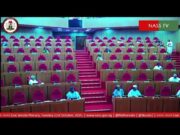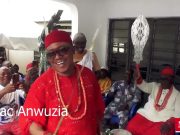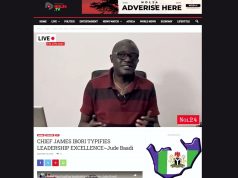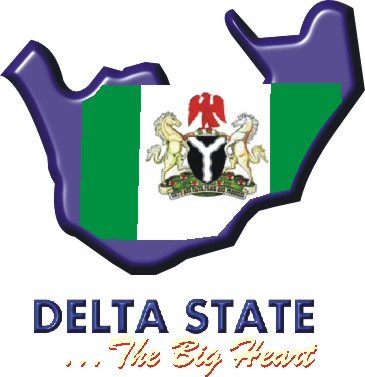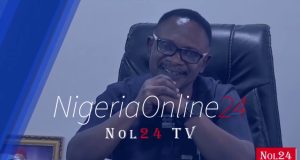By NOL24 TV News Desk | Asaba Bureau
The story of Delta North’s political representation in Nigeria’s Senate is one of transformation, contrasts, and evolving leadership styles. Over three successive senators — Dr. Ifeanyi Okowa, Peter Nwaoboshi, and Prince Ned Nwoko — the Anioma voice in Abuja has journeyed from quiet diplomacy to assertive populism, and now to visionary modernism.
—
🟩 Ifeanyi Okowa: The Policy Reformer (2011–2015)
When Dr. Ifeanyi Okowa first stepped into the red chamber in 2011, he brought with him a reputation for quiet efficiency and medical precision — both literally and politically.
As Chairman of the Senate Committee on Health, Okowa steered one of Nigeria’s landmark legislative achievements: the National Health Act (2014). The Act provided a legal framework for universal healthcare and established a basic health fund that remains central to Nigeria’s public health system.
While Okowa’s tenure was not dominated by brick-and-mortar projects, his influence on policy direction and governance reform was undeniable. His calm and strategic leadership laid the groundwork for his election as Governor of Delta State in 2015, a role in which he broadened his development agenda.
Public Perception:
Okowa was regarded as diplomatic, cerebral, and reform-minded. Critics said his senatorial term lacked tangible projects, but supporters argue that he elevated Delta North’s reputation through credible national service and intellectual depth.
—
🟦 Peter Nwaoboshi: The Political Strongman (2015–2023)
Senator Peter Nwaoboshi’s eight-year tenure in the Senate could best be described as fiery, visible, and deeply polarizing. A seasoned political tactician and former Delta PDP chairman, Nwaoboshi brought Anioma politics into national focus — sometimes for the right reasons, sometimes not.
As Chairman of the Senate Committee on Niger Delta, he wielded influence over NDDC budgets and regional projects. Constituents across Delta North recall numerous empowerment programmes, rural roads, and classroom renovations, many bearing his political imprint.
Yet, his name also surfaced in allegations of contract controversies and party feuds, including a high-profile defection to the APC towards the end of his term.
Public Perception:
To supporters, Nwaoboshi was a grassroots mobilizer who brought federal attention to local communities. To critics, he was a combative figure whose controversies overshadowed his achievements. Regardless, his era marked a shift from policy-based representation to constituency visibility and political muscle.
—
🟥 Ned Nwoko: The Visionary Humanitarian (2023–Present)
With Prince Ned Nwoko, Delta North’s senatorial representation entered a new phase — one defined by modernity, philanthropy, and high public engagement. A lawyer, entrepreneur, and global advocate, Nwoko’s political brand was already established long before his 2023 election victory.
In the Senate, he has championed motions and bills focused on education reform, tourism development, and environmental cleanup, reflecting his global outlook. His advocacy for a Malaria Eradication Project and youth empowerment initiatives aligns with his long-standing humanitarian efforts.
Beyond the chamber, Nwoko’s connection to the people — particularly the youth — remains strong, thanks to his hands-on projects, scholarships, and social investments across the Delta North region.
Public Perception:
Nwoko is seen as charismatic, innovative, and forward-looking, often blending politics with philanthropy. Detractors sometimes view his style as celebrity-driven, but even critics acknowledge his energy and commitment to a modern, development-focused representation.
—
⚖️ Anioma’s Senate Journey: From Policy to People
In a single decade, Delta North’s senatorial experience has evolved through three distinct leadership paradigms:
Okowa’s technocratic reform,
Nwaoboshi’s populist activism, and
Nwoko’s visionary humanitarianism.
Each man has left a unique imprint on Anioma’s political landscape — from Okowa’s intellectual foundation to Nwaoboshi’s grassroots reach and Nwoko’s futuristic ambitions.
For the people of Delta North, the Senate seat has become more than a political office — it’s now a reflection of the region’s growing confidence and changing aspirations.
—
Reporter: NOL24 TV Political Desk
Location: Asaba, Delta State
© 2025 NOL TV News | All Rights Reserved
—
Here’s the CNN-style version — a more global, analytical narrative that frames Delta North’s senatorial leadership in a broader governance and development context:
—
Delta North’s Evolving Voice: Okowa, Nwaoboshi, and Nwoko Redefine Representation in Nigeria’s Senate
By NOL TV Political Desk | Special to CNN Africa
Asaba, Nigeria (CNN) — Over the past decade, the Delta North Senatorial District — home to Nigeria’s Anioma people — has emerged as a fascinating case study in political evolution. From the technocratic poise of Dr. Ifeanyi Okowa, through the assertive populism of Peter Nwaoboshi, to the visionary humanitarianism of Prince Ned Nwoko, the region’s senators have each reshaped what representation means in Nigeria’s upper legislative chamber.
Their distinct styles reveal the shifting priorities of a constituency increasingly conscious of governance, visibility, and global engagement.
—
Okowa: The Policy Architect Who Built the Foundation (2011–2015)
When Dr. Ifeanyi Okowa entered the Senate in 2011, he did so with a physician’s precision and a reformer’s heart. As Chairman of the Senate Committee on Health, he became one of the intellectual architects behind Nigeria’s National Health Act (2014) — landmark legislation that institutionalized universal healthcare funding.
Okowa’s term was quiet yet impactful. Rather than chase visibility, he focused on policy, institutional reform, and consensus building, earning respect from colleagues and technocrats alike. His transition from senator to Governor of Delta State in 2015 underscored his deep credibility within national politics.
> “Okowa approached legislation like a surgeon — strategic, meticulous, and focused on long-term systems,” notes one Asaba-based analyst.
Though critics point to limited constituency projects during his Senate years, many agree that he elevated Anioma’s profile in federal circles through intellectual leadership.
—
Nwaoboshi: The Political Enforcer Who Brought Projects Home (2015–2023)
If Okowa represented policy and diplomacy, Peter Nwaoboshi embodied political grit and grassroots visibility. A former Delta PDP chairman, Nwaoboshi stormed the Senate in 2015 with fierce energy and a deep command of local structures.
As Chairman of the Senate Committee on Niger Delta, he wielded influence over NDDC budgets, steering numerous infrastructural projects and empowerment schemes across Delta North. His tenure saw the construction of roads, classrooms, and rural facilities that tangibly transformed local communities.
But his career was not without controversy. Allegations of contract irregularities and political feuds trailed him throughout his time in office. By the end of his second term, his defection to the APC drew both criticism and curiosity.
Still, for many in Delta North, Nwaoboshi’s era remains synonymous with direct, visible representation — the kind that brought federal projects to the doorstep of ordinary citizens.
—
Ned Nwoko: The Global Visionary Bridging Politics and Philanthropy (2023–Present)
In 2023, Prince Ned Munir Nwoko ushered in a new era — one that merges development activism with modern political engagement.
A lawyer, entrepreneur, and philanthropist, Nwoko’s political profile had long been intertwined with his humanitarian work — from scholarships and sports development to his Malaria Eradication Project that gained international recognition.
In the Senate, Nwoko has positioned himself as a reform advocate, sponsoring bills on education, environmental protection, and tourism development. His speeches reflect a desire to reposition Delta North as a hub for innovation, sustainability, and youth empowerment.
> “Ned Nwoko operates like a 21st-century politician — data-driven, media-savvy, and people-conscious,” says political commentator Emmanuel Nwose.
“He’s trying to turn representation into a tool for global partnership.”
His public appeal, especially among youth, reflects a generational shift toward service-oriented politics. Yet critics warn that his celebrity image could sometimes overshadow the legislative substance of his work.
—
Three Eras, One Journey: The Anioma Transformation
Across these three senators, Delta North’s representation in Abuja mirrors Nigeria’s broader political evolution — from policy foundation (Okowa) to constituency populism (Nwaoboshi) and now modern innovation (Nwoko).
Each era has brought its own brand of impact:
Okowa built the framework for governance credibility.
Nwaoboshi brought tangible projects and political influence.
Nwoko is redefining relevance in the digital and humanitarian age.
Together, they have woven a decade-long story of transformation — from quiet advocacy to bold visibility — and positioned the Anioma people as key stakeholders in Nigeria’s national conversation.
—
Senator Ifeanyi Okowa, Senator Peter Nwaoboshi, and Senator Ned Nwoko have been perceived as representatives of Delta North Senatorial District (Anioma) in the Nigerian Senate — focusing on their performance, leadership style, impact, and public perception.
—
🟩 Senator (Dr.) Ifeanyi Arthur Okowa (2011–2015)
Party: PDP
Tenure: 7th Senate (2011–2015)
Committees: Health, Marine Transport, and others
Later Position: Governor of Delta State (2015–2023)
Performance and Legislative Record
Okowa was widely regarded as a calm, strategic, and developmental-minded legislator.
As Chairman of the Senate Committee on Health, he played a key role in the passage of the National Health Act (2014) — one of Nigeria’s most impactful health policy frameworks to date.
He was also instrumental in healthcare and youth empowerment initiatives that later shaped his gubernatorial agenda.
Projects and Impact
Though his tenure was more policy-driven than constituency-project-focused, he influenced some federal projects and facilitated employment for Delta North youths.
His senatorial term is often viewed as a launchpad for his governorship, where he expanded his development focus.
Public Perception
Generally seen as intelligent, diplomatic, and visionary.
Many constituents credit him for laying the foundation of Anioma’s political relevance in Delta politics.
Critics, however, argue that his direct constituency projects were modest compared to later senators.
—
🟦 Senator Peter Onyeluka Nwaoboshi (2015–2023)
Party: PDP (later APC)
Tenure: 8th & 9th Senate (2015–2023)
Committees: Niger Delta, NDDC, Judiciary, etc.
Background: Former PDP Delta State Chairman
Performance and Legislative Record
Nwaoboshi was an outspoken and politically assertive senator, often in the news for controversies and strong political stances.
As Chairman of the Senate Committee on Niger Delta, he influenced NDDC budget allocations and projects across the Niger Delta.
He sponsored bills and motions related to infrastructure, Niger Delta development, and judicial reforms.
Projects and Impact
Nwaoboshi’s tenure was marked by visible physical projects — road rehabilitations, classrooms, health centres, and empowerment schemes.
Many Delta North communities credit him for “bringing projects home”, especially in Asaba, Ibusa, Ogwashi-Uku, and Issele-Uku areas.
However, there were allegations of contract-related corruption and patronage politics.
Public Perception
Polarized. Supporters saw him as a grassroots senator who ensured federal presence in Anioma; critics viewed him as controversial and combative.
His frequent political battles (including with Okowa and later with PDP leadership) often overshadowed his legislative work.
—
🟥 Senator (Prince) Ned Munir Nwoko (2023–Present)
Party: PDP
Tenure: 10th Senate (2023– )
Committees: Key focus on tourism, education, and youth development
Background: Lawyer, philanthropist, and former House of Reps member (1999–2003)
Performance and Legislative Record (So Far)
Ned Nwoko entered the Senate with a progressive and reformist image, emphasizing youth, education, and infrastructure.
He has sponsored or co-sponsored bills on student loan reform, environmental cleanup, and tourism promotion.
His speeches and motions have reflected nationalist and humanitarian tones, often spotlighting Anioma interests.
Projects and Impact
Known for personal philanthropy even before joining the Senate — scholarships, malaria eradication foundation, and sports development.
Early in his tenure, he launched several community-based empowerment programmes and continues to attract federal attention to Delta North’s environmental and infrastructure issues.
His style is technocratic and media-savvy, appealing to younger voters.
Public Perception
Perceived as charismatic, visionary, and people-oriented, but sometimes criticized for being celebrity-driven rather than purely political.
His emphasis on image, innovation, and humanitarian work has earned him broad youth support and national visibility.
Here’s a concise, sourced comparison of Sen. Ifeanyi (Dr.) Okowa, Sen. Peter Nwaoboshi, and Sen. (Prince) Ned Nwoko — focused on tenure, signature projects/constituency work, leadership style, controversies, and impact for Delta North.
—
Quick snapshot (who & when)
Ifeanyi Okowa — represented Delta North in the Senate earlier (2011–2015) and then served as Governor of Delta State (2015–2023).
Peter Nwaoboshi — Senator for Delta North (2015–2023). Chaired/participated in Niger-Delta related committees while in office.
Ned Nwoko — Elected Senator for Delta North in 2023 (10th Assembly) and currently represents the district in the Senate.
—
Side-by-side (compact table)
Area Ifeanyi Okowa Peter Nwaoboshi Ned Nwoko
Office / Tenure Senator (Delta North) 2011–2015; Governor 2015–2023. Senator (Delta North) 2015–2023; influential on Niger Delta committee work. Senator (Delta North) 2023–present; active in 10th Assembly.
Flagship projects / claims As governor (post-Senate) delivered state infrastructure projects (roads, health, schools) under his “Stronger Delta” agenda — built on earlier constituency work as senator. (State & national press summaries). As senator claimed constituency interventions and Niger-Delta projects; public visibility around local works — but project record is often discussed alongside accountability questions. Emphasises rapid constituency roll-out: publicised facilitation of ≈₦30 billion in federal/special-intervention projects (dams, irrigation, electrification, agric support, MSME grants) aligned to federal “Renewed Hope” agenda.
Leadership style Technocratic, administrative — reputation for methodical governance from his time as governor and earlier civil-service roles; consensus/party operator. Assertive, local powerbroker; strong partisan posture and committee influence in Senate; transactional, high-profile in Delta politics. High-profile, activist legislator style — promotes large, visible constituency programs; media-forward and personally hands-on in project launches.
Controversies / accountability Some criticisms in media about governance choices (normal for long-serving governors); no recent, major national-level conviction records like peers. Faced high-profile corruption/money-laundering court cases (conviction by Court of Appeal in 2022 reported in press, later developments included Supreme Court decisions). Legal history has affected public perception. Largely promoted for delivery of projects; party movement and high visibility sometimes draw debate, but fewer major public legal scandals than Nwaoboshi (so far).
Impact assessment (Delta North) Strong institutional impact via state programs while governor; as senator earlier, known for equitable distribution messaging and local networks. Overall lasting infrastructural footprint at state level. Mixed: brought attention and some projects to the district but legacy clouded by legal controversies — which reduced political capital and raised accountability questions. Rapid, visible constituency rollout since 2023 (claims of ₦30bn+ projects). Impact depends on delivery quality and sustainability — early signs point to high short-term visibility.
—
Short analytical take
Okowa: Best seen as a system builder — his greatest, durable impact on Delta North comes via his longer tenure as governor (state infrastructure and programs). His Senate stint earlier was more low-profile compared with his governorship record.
Nwaoboshi: A political operator who used Senate committee positions to influence Niger-Delta affairs. His record is mixed because court cases and corruption allegations have overshadowed some of his constituency work; that damaged trust for some constituents.
Ned Nwoko: The fast-moving deliverer — since 2023 he has pushed a high volume of constituency projects and publicity around them (dams, agriculture, electrification). If projects are completed and sustained, they could deliver tangible benefits; if they are largely short-term or poorly supervised, the high numbers will mean little in the long run.
—
What to watch / recommended follow-ups
1. Verification of projects — for Ned Nwoko’s ₦30bn claim: check specific project contracts, contractors, and commissioning reports (local government records / federal intervention lists).
2. Audit & sustainability — for all three, see whether road, dam, or electrification projects have maintenance plans — that determines long-term impact.
3. Legal records — for Nwaoboshi (and any future allegations), consult court judgments and EFCC releases rather than only press summaries to confirm status.
—
⚖️ Overall Comparison Summary
Attribute Okowa Nwaoboshi Nwoko
Era 2011–2015 2015–2023 2023–Present
Leadership Style Diplomatic, policy-focused Assertive, populist Visionary, modern
Legislative Strength Health & governance reforms Niger Delta, infrastructure Youth & development advocacy
Project Delivery Moderate High Emerging
Public Image Technocrat, respected Controversial but impactful Charismatic, humanitarian
Legacy (so far) Built credibility for Anioma politics Brought physical projects but faced scandals Rebranding Anioma representation for a new generation
—
Reporting by: NOL24 TV Political Desk
Editing by: NigeriaOnline24 Delta Bureau
Location: Asaba, Delta State
© 2025 NOL24 TV / NigeriaOnline24 — All Rights Reserved


